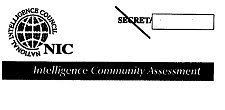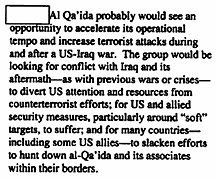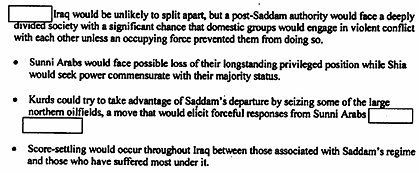Latest Intelligence Report Yet Another Smoking Gun On Bush
 When Army Chief of Staff, General Eric Shinseki appeared before the Senate Armed Services Committee on February 25, 2003 to discuss preparations for a possible invasion of Iraq, he was asked by Senator Carl Levin (D-MI) to estimate the size of a successful occupation force after victory.
When Army Chief of Staff, General Eric Shinseki appeared before the Senate Armed Services Committee on February 25, 2003 to discuss preparations for a possible invasion of Iraq, he was asked by Senator Carl Levin (D-MI) to estimate the size of a successful occupation force after victory."Something on the order of several hundred thousand soldiers are probably a figure that would be required," said Shinseki, a highly-decorated officer with almost four decades of service, including extensive combat duty in Vietnam. "We're talking about a post-hostilities control over a piece of geography that's fairly significant, with the kinds of ethnic tensions that could lead to other problems."
"It takes a significant ground force presence to maintain a safe and secure environment, to ensure that people are fed, that water is disturbed, all the normal responsibilities that go along with administering a situation like this."
Shinseki was immediately jumped by Secretary of Defense Donald Rumsfeld and Deputy Defense Secretary Paul Wolfowitz. Rumsfeld said publicly that Shinseki was "far off the mark" in his prediction, while Wolfowitz called his views "wildly off the mark" and said, "I am reasonably certain that they will greet us as liberators, and that will help us to keep requirements down."
The Village Voice even reported that a "senior administration official" said that Shinseki's estimate was "bullshit from a Clintonite enamored of using the army for peacekeeping and not winning wars".
General Shinseki "retired" shortly thereafter, in June 2003, and it is widely speculated that he was forced out for contradicting Bush's take on what would be required by the Army in Iraq. Shinseki has confirmed only that he was indeed forced into retirement, while withholding comment about any specifics.
 Which makes the report issued by the Senate Intelligence Committee before the Memorial Day holiday even more interesting because Prewar Intelligence Assessments About Postwar Iraq (PDF) shows not only that Shinseki was right about troop levels, but also -- as if more evidence is needed -- that the Bush administration ignored critical pre-war intelligence in their rush to invade Iraq.
Which makes the report issued by the Senate Intelligence Committee before the Memorial Day holiday even more interesting because Prewar Intelligence Assessments About Postwar Iraq (PDF) shows not only that Shinseki was right about troop levels, but also -- as if more evidence is needed -- that the Bush administration ignored critical pre-war intelligence in their rush to invade Iraq.The report, which the previous Republican Congress successfully kept from being produced for two years, shows that months before the Iraq invasion, the White House knew from U.S. intelligence agencies that a civil war would likely erupt after Saddam's ouster, that al-Qaeda would quickly move to exploit the American occupation and that Osama bin Laden's organization would actually gain strength globally due to Bush's action.
"Prior to sending troops to Iraq, the Bush Administration promoted the terrorist nexus between Iraq and al-Qa'ida (and the attacks of 9/11) as a central part of its case to the American people that Iraq posed an imminent threat that only military action could extinguish, despite the Intelligence Community's view that Iraq and al-Qa'ida viewed each other with suspicion and were not operationally linked," said Senate Intelligence Committee Chairman Jay Rockefeller (D-WV) in the report.
"What the Administration also kept from the American people were the sobering intelligence assessments it received at the time warning that the post-war transition could allow al-Qa'ida to establish the presence in Iraq and opportunity to strike at American it did not have prior to the invasion."
The report reinforced Shinseki's original contention -- which further bolsters the image of a Bush White House that wanted to do the war their way regardless of expert opinion -- that up to 400,000 troops might be required to "keep the peace" after the initial invasion due to a severely damaged national infrastructure and the virtual certainty of sectarian violence.
"Sunni Arabs would face possible loss of their longstanding privileged position while Shia would seek power commensurate with their majority status," says the report. "Kurds could try to take advantage of Saddam's departure by seizing some of the large northern oilfields, a move that would elicit forceful responses from Sunni Arabs. Score-settling would occur throughout Iraq between those associated with Saddam's regime and those who have suffered most under it."

The report also pointed out that with such an overwhelming U.S. focus on maintaining the Iraq occupation, Osama bin Laden and Company would be allowed to flourish and operate with greater ease in other countries, saying that the White House should expect "…many countries -- including some US allies -- to slacken efforts to hunt down al-Qa'ida and its associates within their borders."
And now that the Congress is in Democratic hands and once again back to the business of actually performing their Constitutional oversight role, the Intelligence Committee's report makes very clear that George W. Bush got ample warning that an Iraq invasion would require far greater military might than they had planned and that the action itself would embolden the terrorists -- as the GOP has so often accused those now against the war of doing.
"A US-led war against and occupation of Iraq would boost political Islam and increase popular sympathy for some of the terrorist objectives," the report concluded.
 The key thing to remember about the data presented in this report is that is was released months before the war and in a wide distribution that went from Bush right on down to Barney the White House dog. It also sheds a bright spotlight on another prevailing Bush administration lie that nobody could have foreseen what has unfolded in Iraq over the last four years.
The key thing to remember about the data presented in this report is that is was released months before the war and in a wide distribution that went from Bush right on down to Barney the White House dog. It also sheds a bright spotlight on another prevailing Bush administration lie that nobody could have foreseen what has unfolded in Iraq over the last four years."The wide-distribution of these pre-war Intelligence Community assessments within the White House, the Office of the Vice President, the National Security Council and the Departments of Defense and State removes any doubt that these warnings were received at the highest levels of the Administration," said Rockefeller in the report.
And since Bush got this data, we've spent almost half a trillion dollars, had almost 3,500 troops killed, another 25,000 wounded and our global reputation destroyed.
Finally, it's important to note the proud members of the do-nothing Republican Congress who, while neutered of their majority status on the Intelligence Committee, still tried to stonewall this report by voting "nay" on its release. They are:
- Christopher "Kit" Bond (R-MO)
- Richard Burr (R-NC)
- Saxby Chambliss (R-GA)
- Orrin Hatch (R-UT)
- John Warner (R-VA)
"In doing so, the Bush Administration once again demonstrated its practice of cherry-picking intelligence reports and assessments that support policy objectives and denigrating or dismissing those which did not."

















<< Home